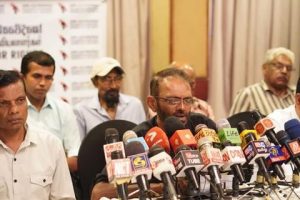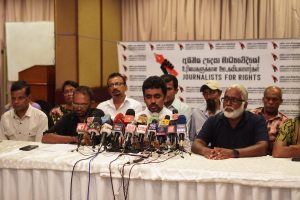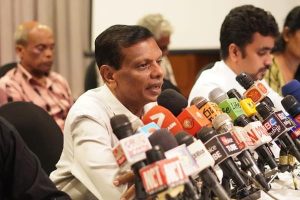
April 8, Colombo: The government has recently passed many new laws, among which some are favourable to the public while others restrict the rights of the people, said Mr. Dulan Dasanayake, Attorney-at-law, Secretary of the Journalists for Rights trade union, during a press conference held on April 8, 2024, in Colombo. He further stated:
“For the first time in the history of Sri Lanka, such a significant number of laws are being introduced. The President mentioned in a meeting with lawyers that an additional 40-50 new laws are set to be presented.
“The recently passed Online Safety Act is a subject of controversy. When this law was introduced, we, as journalists advocating for rights, shared our opinions on it. When enacting such laws, it’s important to engage in discussions with the public, media organizations, and journalists. We also emphasized the need for some regulations because social media has a significant impact on people’s lives. However, we insisted that any such law should protect the freedom of speech and expression of the people.
“A proposal has been submitted to the Cabinet to amend this Act as requested by journalists advocating for rights, and we hope that the new Act will be passed in Parliament with those amendments.
“Problems arise in the passage of bills because the government often passes them suddenly without public consultation. By filing a fundamental rights petition to the Supreme Court against a bill, we can only inquire whether the bill violates the Constitution. The government should also be aware of the impact of these rules and regulations related to freedom of speech and expression on people’s lives.
“A draft has been presented to amend the Penal Code to change the age of consent in sexual relations and other matters. This is a prime example of bills being introduced without adequate discussion even with government agencies. Even the National Child Protection Authority has expressed its objections to this bill. Due to societal protests, the government had to withdraw the draft.
“The Anti-Corruption Act is a significant piece of legislation brought by the government. There was a substantial public discourse on corruption involving academics, lawyers, professionals, and civil society activists, and the act was prepared with widespread public participation. The act was also discussed by the country’s leading lawyers, and there was ample debate regarding the bill in Parliament.
“A draft for the establishment of a Commission on Truth, Unity, and Reconciliation has been included in the parliamentary agenda. This bill should also undergo sufficient discussion.
“An amended Anti-Terrorism bill has also been gazetted. This bill has not yet been included in the parliamentary agenda. When the previous bill was presented, there were strong objections from society regarding several clauses in it. The incorporation of certain laws under the emergency law into general law will address those objections. The Anti-Terrorism Bill has some positive aspects, such as the prohibition of using confessions as evidence, the requirement to inform the Human Rights Commission, and increasing the involvement of magistrates but strong opposition was caused by its negative aspects.”
Chairman of Journalists for Rights Ajith Parakum Jayasinghe, Treasurer Rohana Siriwardena, National Organizer Janur Kichilan, and others also spoke at the press conference held after the General Assembly of Journalists for Rights on April 8, 2024, at the Janaki Hotel, Colombo.


